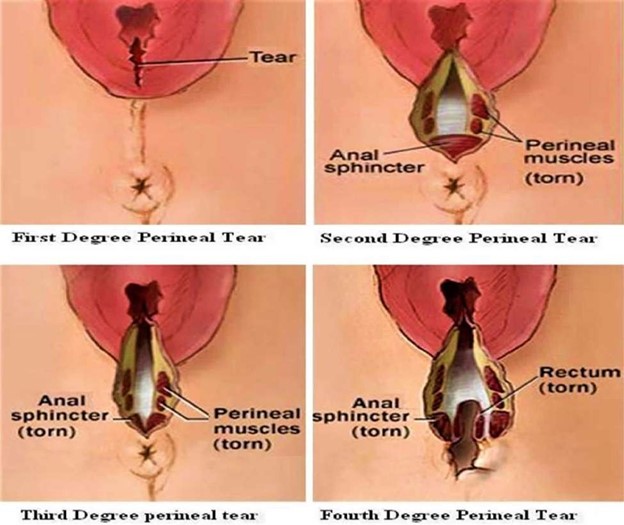A nurse is reviewing the chart of a client who is 2 days postpartum following a vaginal delivery and reports constipation.
Which of the following findings should the nurse identify as a contraindication to the use of a suppository?
Abdominal distention
Afterpains
Vaginal candidiasis
Third-degree perineal laceration.
The Correct Answer is D
A third-degree perineal laceration is a tear that extends through the vaginal tissue, perineal skin, and perineal muscles and involves the anal sphincter.

This type of laceration requires careful repair and management to prevent complications such as infection, fecal incontinence, and pain.
Choice A is incorrect because abdominal distention is not a contraindication to the use of a suppository.
Choice B is incorrect because afterpains are common postpartum uterine contractions and are not a contraindication to the use of a suppository.
Choice C is incorrect because vaginal candidiasis is a fungal infection and is not a contraindication to the use of a suppository.
Nursing Test Bank
Naxlex Comprehensive Predictor Exams
Related Questions
Correct Answer is A
Explanation
A client who is postpartum and experiencing hypovolemic shock would have cool, clammy skin.
This is because hypovolemic shock severely limits the body’s ability to get blood
to all of its organs.

Choice B is not correct because a urinary output of 30 mL/hr is within the
normal range.
Choice C is not correct because a client experiencing hypovolemic shock would have a weak pulse, not a bounding one.
Choice D is not correct because a respiratory rate of 18/min is within the normal range, while a client experiencing hypovolemic shock would have an increased respiratory rate.
Correct Answer is A
Explanation
Broccoli is a good source of calcium for vegans.
Choice B is incorrect because bananas are not mentioned as a good source of calcium for vegans.
Choice C is incorrect because avocados are not mentioned as a good source of calcium for vegans.
Choice D is incorrect because potatoes are not mentioned as a good source of calcium for vegans.
Whether you are a student looking to ace your exams or a practicing nurse seeking to enhance your expertise , our nursing education contents will empower you with the confidence and competence to make a difference in the lives of patients and become a respected leader in the healthcare field.
Visit Naxlex, invest in your future and unlock endless possibilities with our unparalleled nursing education contents today
Report Wrong Answer on the Current Question
Do you disagree with the answer? If yes, what is your expected answer? Explain.
Kindly be descriptive with the issue you are facing.
